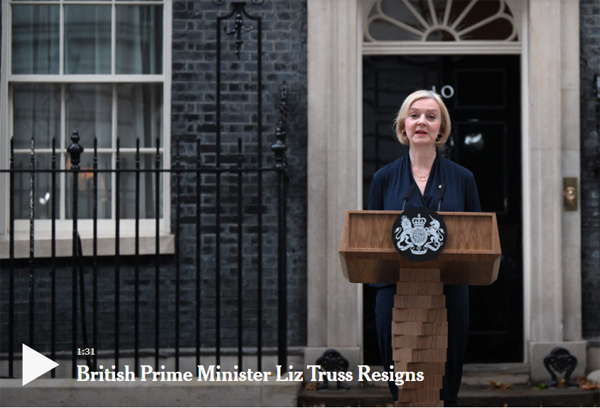
Mark Landler and Stephen Castle, NYT
LONDON
EnergiesNet.com 10 20 2022
LONDON — Prime Minister Liz Truss of Britain said on Thursday that she was stepping down after only six weeks in office, the shortest tenure ever for a British prime minister. Her announcement came just days after her new finance minister reversed virtually all of her planned tax cuts, sweeping away a free-market fiscal agenda that plunged the country into weeks of economic and political turmoil. Ms. Truss will remain the Conservative Party leader and prime minister until a successor is chosen within the next week — with a field of potential contenders that includes key figures from her cabinet, former rivals for leadership of the party and even Boris Johnson, who had his own messy departure from Downing Street just last month.
Here’s what to know:
- One week is an extraordinarily quick turnaround for a leadership election, and the procedure for selecting Ms. Truss’s successor is unclear. It will be presided over by Graham Brady, the chairman of a powerful committee of Conservative lawmakers, who told reporters that party members would be consulted about who the new leader would be. But he gave few details on the process and left open several scenarios.
- “I cannot deliver the mandate on which I was elected,” Ms. Truss said in brief remarks announcing her resignation alongside her husband outside 10 Downing Street.
- Ms. Truss’s political viability became tenuous after her proposals for broad unfunded tax cuts roiled markets and sent the pound’s value plunging. She suffered a grave blow on Monday when her newly appointed chancellor of the Exchequer, Jeremy Hunt, said that the government was undoing the last vestiges of Ms. Truss’s tax proposals, one of the most dramatic reversals in modern British political history.
- Among the leading candidates to succeed Ms. Truss are Rishi Sunak, the former chancellor of the Exchequer who lost to Ms. Truss in the party leadership campaign over the summer; Penny Mordaunt, the leader of the lower house of Parliament; and Ben Wallace, the defense secretary. And some want Mr. Johnson back.
- The British pound and government bond prices inched higher after the announcement, but the market’s reaction was muted. While the change brings a firm end to Ms. Truss’s tax-cutting economic agenda, it introduces even more political instability to Britain at a time when households and businesses are grappling with a cost-of-living crisis.
Rules announced on Thursday say the candidates in the contest to succeed Liz Truss as party leader need a minimum of 100 nominations to take part. Given that there are 357 Conservative lawmakers in Parliament, the contest could be effectively over when nominations close. If only one has enough nominations by 2 p.m. Monday, that candidate will become party leader, and prime minister.
If three are in the race, then a ballot among lawmakers will take place on Monday, whittling that number to two. Unless the second-place candidate drops out, those two names will go to party members in an online vote that will conclude on Oct. 28. Either way, this will be the shortest Conservative leadership contest in memory.
Some of Britain’s economic headaches are new, while others aren’t.
Through all the ups and downs of the past few weeks, one thing hasn’t changed: Britain’s economy is still in troubled waters.
As prime minister, Liz Truss set out to shake up the status quo and put the nation on a path to faster economic growth through tax cuts and deregulation. Instead, her economic plan generated turmoil throughout financial markets, leading her government to reverse virtually all of the planned tax cuts.
But government bond yields are significantly higher than they were on Sept. 22, the day before the tax plan was announced, leaving Britons worse off in a number of ways.
Traders are betting that the Bank of England, over the next year, will raise interest rates higher than previously expected, causing loans to businesses and households to be more expensive. Mortgages rates are rising, too, making homes more costly, and the government’s own borrowing costs are increasing.
Then there are all of the other longstanding economic issues in Britain, where the economy has been blighted by weak productivity and low pay growth for more than a decade.
Since Brexit, the nation has had more barriers with its largest trading partner, the European Union, business investment has been lackluster and companies have lost easy access to a large pool of workers. The National Health Service is overburdened, and the immense backlog of patients needing care is keeping many of them out of work.
In addition, like many nations, Britain is enduring the highest pace of inflation since the 1980s, taking the momentum out of consumer spending and economic growth.
While Britain shares some economic problems with other advanced economies, its outlook for inflation is particularly painful. Consumer prices in the country rose 10.1 percent in September from a year earlier, with the annual inflation rate returning to its fastest pace since 1982.
Inflation is expected to peak in November, and the International Monetary Fund said this month that inflation at the end of next year would be nearly three times as high as the forecast for the United States, although a reversal in the British government’s policy to hold down household energy bills has made the future path of prices even more uncertain.
Even after Ms. Truss began backtracking on her tax plan last week, some economists stuck to their expectations of an economic downturn in Britain. Samuel Tombs, an economist at Pantheon Macroeconomics, wrote that he still forecast “a 1.5 percent year-over-year decline in G.D.P. next year.”
Reporting from London: Stephen Castle, Eshe Nelson
nyt.com 10 20 2022











